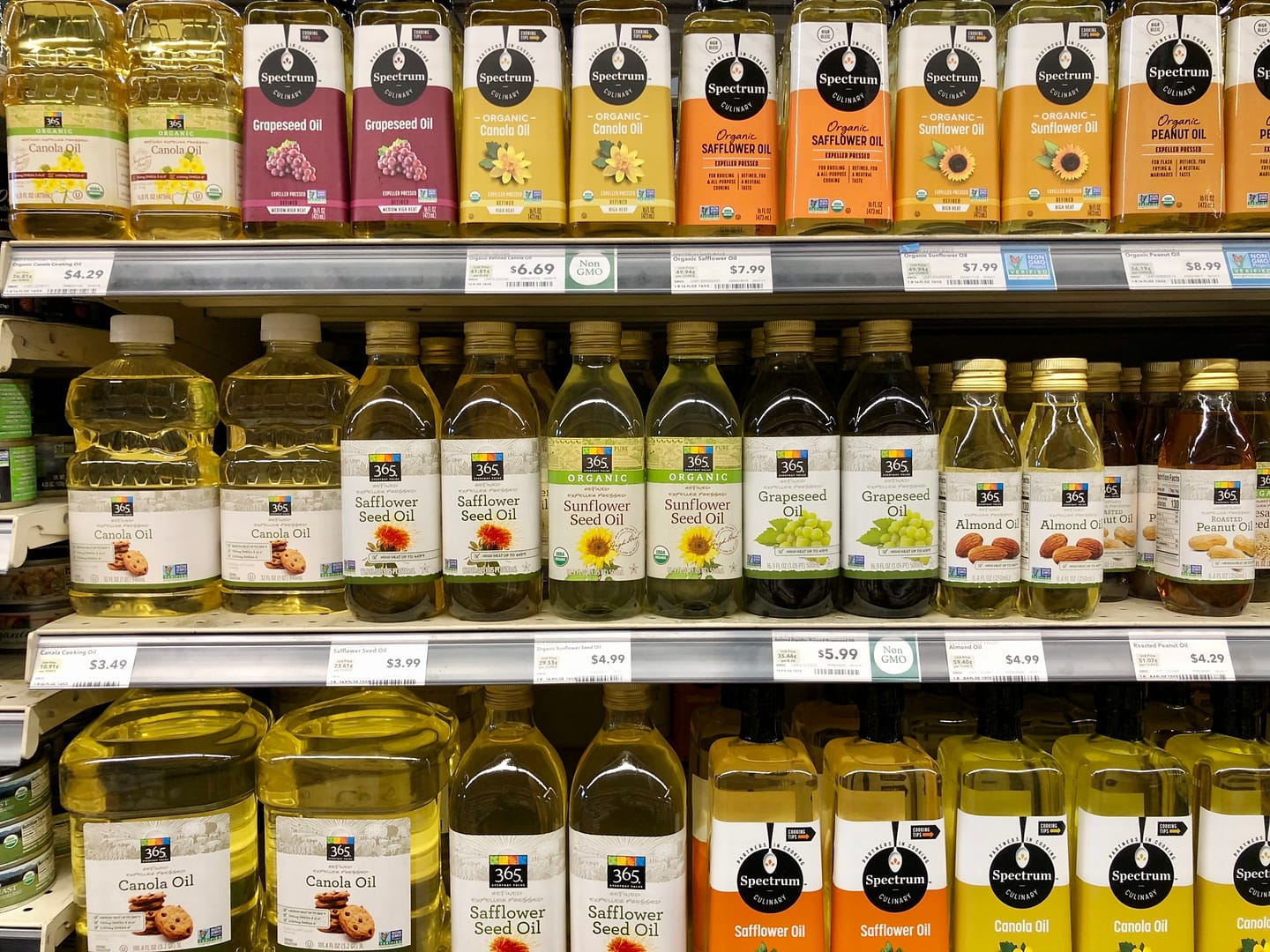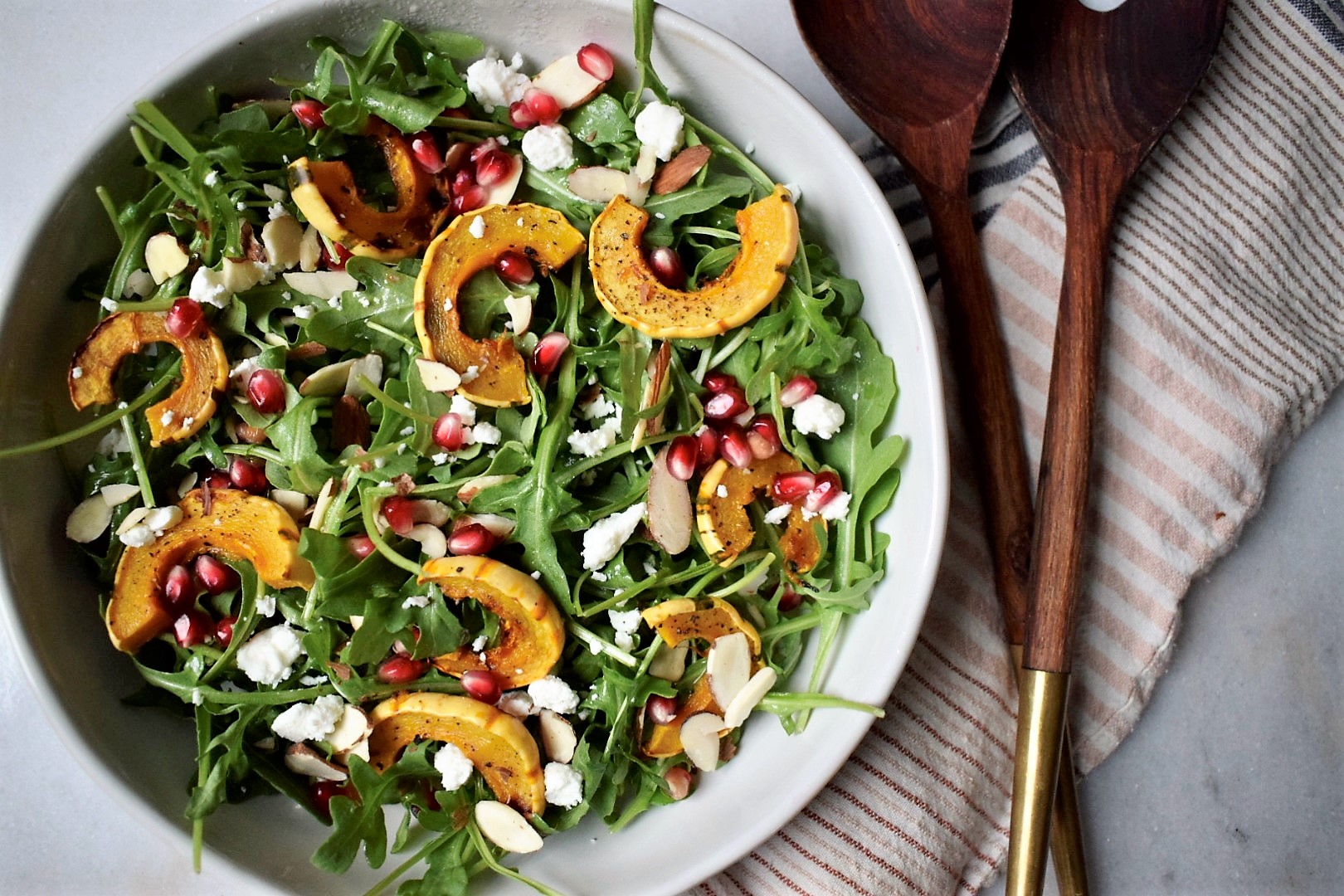What's the Problem with Vegetable Oil?

This post contains affiliate links. This means that I my receive a small commission if you make a purchase through one of these links at no additional cost to you. This helps to support the expenses of running this website site. See disclaimer for more info.
What's the problem with refined seed oils? (aka "vegetable oils")
I’ve made a lot of comments about avoiding refined “vegetable oils” and it’s a topic that many people are interested in learning more about, understandably. Once you start paying attention, you’ll see that these oils are everywhere, but this topic isn’t part of the mainstream conversation on nutrition and healthy eating. To make matters more confusing, we were told for years that these were “heart healthy” oils that should be consumed in place of saturated fats, and some doctors still hold these beliefs. However, this was from a time when the food pyramid of my childhood was propagated, with bread and processed carbs recommended as the foundation of a healthy diet rather than whole foods like fruits and vegetables!
A resounding call for concern in the wellness community

An overview of RBD (vegetable) oils
The most common vegetable oils are canola (rapeseed), soy, corn, sunflower, safflower, grapeseed, and ricebran oils. With soybean, canola, palm, and corn oil being the most consumed oils in the US. They’re called RBD oils because of the manufacturing process; they are refined, bleached, and deodorized (source).
The vast majority of these crops are also generically modified. Regardless whether or not a GMO crop is problematic in nature, my greatest concern is that they’re engineered to withstand being sprayed with glyphosate and 2,4-D (source), two things I certainly want to avoid as much as possible.
How are vegetable oils made?


What's the problem with eating vegetable oils?
Apart from the manufacturing process and chemical residue, what really matters is how these oils impact the body. I’m not a scientist and neither are most of my readers, so I’m going to break it down as simply as possible based on all my research. Please click through the source links if you’d like to get more detailed info.
Polyunsaturated fatty acids (PUFAs)
One of the main issues is that these oils have a high percentage of polyunsaturated fatty acids (PUFAs). By contrast, a natural oil like coconut oil is high in saturated fatty acids and very low in PUFAs. PUFA molecules are unstable, highly reactive to heat, and react with oxygen.
They are considered toxic because “they promote free-radical reactions that damage our cellular machinery including mitochondria, enzymes, hormone receptors, and DNA” (source). When heated, these oxidized fats cause inflammation and cancer-causing mutations in cells (source).
Omega-6 fats cause inflammation
These oils are also very high in Omega-6 fat and the ratio of Omega-6s to Omega-3s is a very important piece of the equation. In a natural / traditional / ancestral diet (essentially, how we evolved as a species), we should have roughly a 1:1 ratio of Omega-6 to Omega-3 essential fatty acids in our diet. However, the modern Western diet is 15:1 or more, which means most of us have too many Omega-6s and are deficient in Omega-3s (source). Numerous studies have demonstrated that this skewed ratio of Omega-6 PUFAs “promote the pathogenesis of many diseases, including cardiovascular disease, cancer, and inflammatory and autoimmune diseases, whereas increased levels of omega-3 PUFA (a low omega-6/omega-3 ratio) exert suppressive effects.” (source)
Put simply by Dr. Mark Hyman: “Omega 6 fats not only fuel your body’s inflammatory pathways, but also reduce availability of anti-inflammatory omega 3 fats in your tissues, resulting in more inflammation.” And inflammation, my friends, is the root of most chronic diseases the modern world (source).
Inflammation also linked to mood disorders and mental illness
To sum up, here are all the health conditions (chronic inflammatory diseases) linked to the increased ratio of Omega 6 to Omega 3 fats:
- Nonalcoholic fatty liver disease
- Cardiovascular disease
- Obesity
- Inflammatory bowel disease
- Rheumatoid arthritis
- Alzheimer’s disease
- Fertility and reproductive issues
- Cancer
- Autoimmune disease
- Psychiatric disorders
- Type 2 diabetes
- Metabolic syndrome or pre-diabetes
- Macular degeneration (eye damage and blindness)
- Asthma
How to avoid vegetable oils
- I liberally use olive oil (low heat), avocado oil, coconut oil, grass-fed butter or ghee, and a small amount of toasted sesame oil (low heat).
- I avoid just about everything else, mainly: canola oil, soybean oil, corn oil, safflower oil, sunflower oil, rice bran oil, and grapeseed oil.

These are the steps I recommend taking to avoid processed seed and vegetable oils
- Minimize packaged food. Most, even “health foods” are made with processed vegetable oils. Once you know what to look for, there are plenty of good choices out there, but know that the vast majority of packaged foods are highly processed and include these refined oils.
- Avoid fried foods. Not only are these definitely soaking up unwanted oils and trans fats, the oil reused in a fryer is easily oxidized (rancid), which produces free radicals that are damaging to cells and our health in many ways (source).
- Avoid pre-made salad dressings. It’s extremely uncommon for a salad dressing to be made with a quality oil. Look closely and you’ll typically see soy, corn, or canola as the first ingredient. It’s really easy and less expensive to make your own (I do EVOO, champagne vinegar, salt and pepper almost every night and it’s delicious!).
- Avoid mayonnaise and mayonnaise-based salads (tuna salad, chicken salad, egg salad, coleslaw, etc). Conventional mayo is usually made with canola oil and that’s what’s used for prepared salads at restaurants. It’s easy to make your own, but I buy 100% Avocado Oil mayo and use that on it’s own, with aiolis/dips, and mayo-based salads. This is my favorite brand.
- Make your own food. Basically everything prepared in a restaurant is made with vegetable oil, and that goes for “healthy” eateries like the Whole Foods Salad bar and Sweetgreen (almost all of their dressings are made with Grapeseed oil). This is why I think that home cooking is your best bet for clean eating.
- Hummus and other spreads: check ingredients carefully. The vast majority are made with industrialized seed oils.
The bottom line: you probably can't eliminate them, but you can reduce your intake substantially
Unfortunately, I think it would be near impossible to completely eliminate these oils from your diet. Unless you never eat out, you’re probably going to consume refined vegetable oils. However, use this information to make better choices as often as you can:
- Ask for a side of olive oil and vinegar rather than pre-made dressings
- Read your labels (jump for joy when you find packaged foods that are made with butter, avocado oil, coconut oil, or olive oil like me!)
- Control what goes into your food and your body by cooking as much as you possibly can! That is one of my main goals in sharing easy and approachable recipes!







